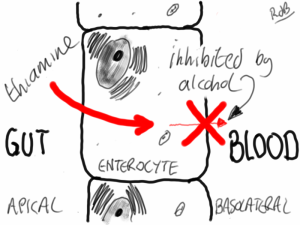Alcoholics have poor nutritional status. In particular alcoholics are often deficient in a number of B vitamins, including thiamine. Wernicke-Korsakoff syndrome is a cluster of neurological disorders associated with alcohol induced thiamine deficiency that includes palsies, ataxia of gait, nystagmus and confusion. The effects of alcohol (ethanol) consumption on thiamine metabolism however is controversial. It has been suggested for example, that alcohol is able to alter normal thiamine metabolism perhaps by decreasing absorption rates, thereby causing deficiencies in alcoholics. However, secondary effects of alcohol consumption may also result in low thiamine status. For example, the liver damage that often accompanied alcoholism can alter a myriad of metabolic pathways involving vitamins. The role of the diet in the poor thiamine status of alcoholics should also be considered. Alcohol calories tend to substitute for carbohydrates, and as carbohydrate foods can supply substantial amounts of thiamine, intakes may fall. Further, the general poor diet of the alcoholic may contribute to thiamine deficiencies.
Animal experiments have been used to investigate the effects of ethanol of thiamine status. For example, in one study1, researchers fed rats a liquid diet containing thiamine in excess to metabolic requirements. The animals were then paired, with one of the pair receiving alcohol at 36 % total colores. After 6 months of chronic alcohol feeding, the thiamine status of the rats was not affected in comparison to alcohol free rats. Tissue levels of thiamine were assessed by measuring transketolase, thiamine pyrophosphate or using the Ochromonas danica assay. Control rats that were deliberately fed a thiamine deficient diet showed mental deterioration in terms of their ability to complete challenging tasks, but the alcohol fed rats did not show impairment in these tests. In another set of experiments, baboons were fed thiamine and alcohol for upto 3 years at 50 % of total calories, but this did not affect urinary thiamine excretion or blood levels of thiamine. Therefore alcohol when administered with thiamine does not cause thiamine deficiencies.
These results suggest that the effects of alcohol of thiamine deficiency can be overcome with additional thiamine in the diet. The thiamine deficiencies seen in alcoholics, assuming similarities between animals and humans, are therefore likely caused by alcohol in combination with low dietary intakes of thiamine. However, this does not mean that ethanol does not affect thiamine metabolism. In fact available evidence suggests that the metabolic effects of ethanol include impairment of absorption from the gastrointestinal tract, a process that likely occurs mainly in the upper small intestine. In support of the evidence from animal studies, it has been speculated that alcohol is only able to negatively affect thiamine absorption in humans to a limited degree2. As a result the impairment of thiamine absorption by alcohol is only likely to manifest as clinical neurological impairment in those with marginal status, or already impaired metabolism due to the secondary health effects of alcoholism.

Figure 1. The inhibition of thiamine absorption by alcohol likely occurs on the basolateral side of the enterocyte.
Dr Robert Barrington’s Nutritional Recommendation: Thiamine deficiency is a problem in alcoholics. However, supplementation of the alcoholic with thiamine to excess can prevent the development of neurological problems associated with thiamine deficiency. The main point of interaction between alcohol and thiamine appears to be at the level of the gut. In this respect alcohol may interfere with the transport of thiamine across the basolateral surface of the enterocyte (figure 1). However, in moderate drinkers there is no real evidence that this could cause any sort of negative health effect. This is particularly true if the diet of the individual is of high quality and contains adequate thiamine. Further, alcohol confers a number of mental and physical health benefits to humans. Moderate alcohol consumption for example is associated with a reduced risk of cardiovascular disease. In addition, the social interaction brought about by alcohol consumption is likely highly beneficial to the well being of the individual.
RdB
